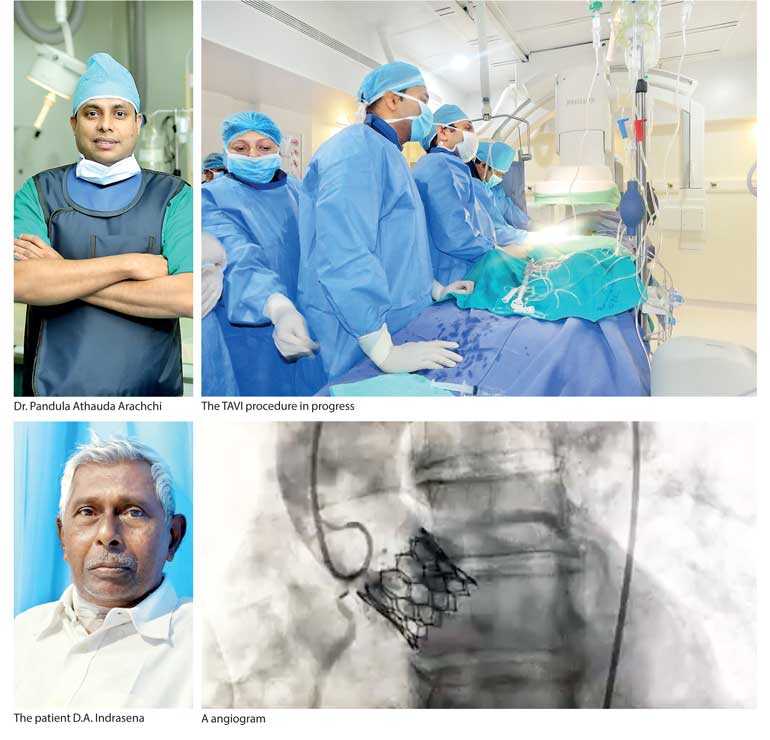Saturday Feb 21, 2026
Saturday Feb 21, 2026
Friday, 28 September 2018 00:00 - - {{hitsCtrl.values.hits}}
 The first-ever balloon expandable transcatheter aortic valve implantation (TAVI) – (without open heart surgery) was performed on an 82 year old patient with Ischemic Heart Disease and poor lung function by Dr. Pandula Athauda-Arachchi Resident Consultant Interventional Cardiologist of Durdans Hospital. This was the first time that a procedure of this nature was done in Sri Lanka under local anaesthetic without any complications, with the patient being fully awake.
The first-ever balloon expandable transcatheter aortic valve implantation (TAVI) – (without open heart surgery) was performed on an 82 year old patient with Ischemic Heart Disease and poor lung function by Dr. Pandula Athauda-Arachchi Resident Consultant Interventional Cardiologist of Durdans Hospital. This was the first time that a procedure of this nature was done in Sri Lanka under local anaesthetic without any complications, with the patient being fully awake.
The patient, an elderly male residing in Kandy, diagnosed with coronary artery disease and aortic valve disease, also presented breathing difficulties and had previously suffered from a stroke. The patient was deemed high risk by cardiothoracic surgeons for an aortic valve replacement and bypass operation.
Previously, the patient had had a stent placed and undergone a balloon aortic valvuloplasty (BAV) performed by Dr. Arachchi which was a temporary solution to buy more time until long term treatment was made available. The continuing deterioration of the patient’s condition prompted Dr. Arachchi to obtain permission from the ethics committee of the hospital (since it was a first time procedure) to implant a transcatheter aortic valve. Owing to the experience and TAVI accreditation gained by Dr. Arachchi as a Consultant in the UK this first time procedure was deemed possible along with the availability of the valve.
After conducting thorough TOE and CT assessments, the procedure, a minimalistic approach without any surgical input, was performed by inserting a catheter through the groin arteries under local anaesthetic only where the patient was awake for the entire procedure. Pre-dilation balloon expansion was administered, the aortic valve assembled through the aortic annulus and the valve implanted under rapid pacing. Resulting in a perfect aortic valve without any complications or bleeding during or after the procedure.
Dr. Arachchi said, “Immediately after the procedure the patient was able to perform activities such as eating, passing urine, etc., and 12 hours after the procedure patient was able to get out of bed and mobilise. The results are comparable to patients I have treated similarly in United Kingdom.” The patient’s son said: “After the procedure my father was quite ok. His recovery was fast. In the morning we walked and he told me that he doesn’t feel breathless like he used to feel earlier.”
Dr. Arachchi said, “We want to get the technology in here because there are many heart valve patients who are declined surgery due to co-morbidity. These patients can be treated with this minimalistic approach.
At Durdans, the presence of comprehensive heart teams with cardiac surgical/cardiac anaesthesia backup helps cardiac specialists boldly perform procedures like this without hesitation.”
For Durdans Heart Centre Channelling contact on 011 2 140 205.